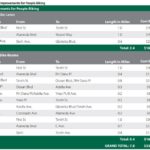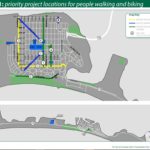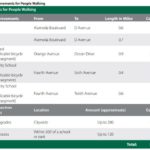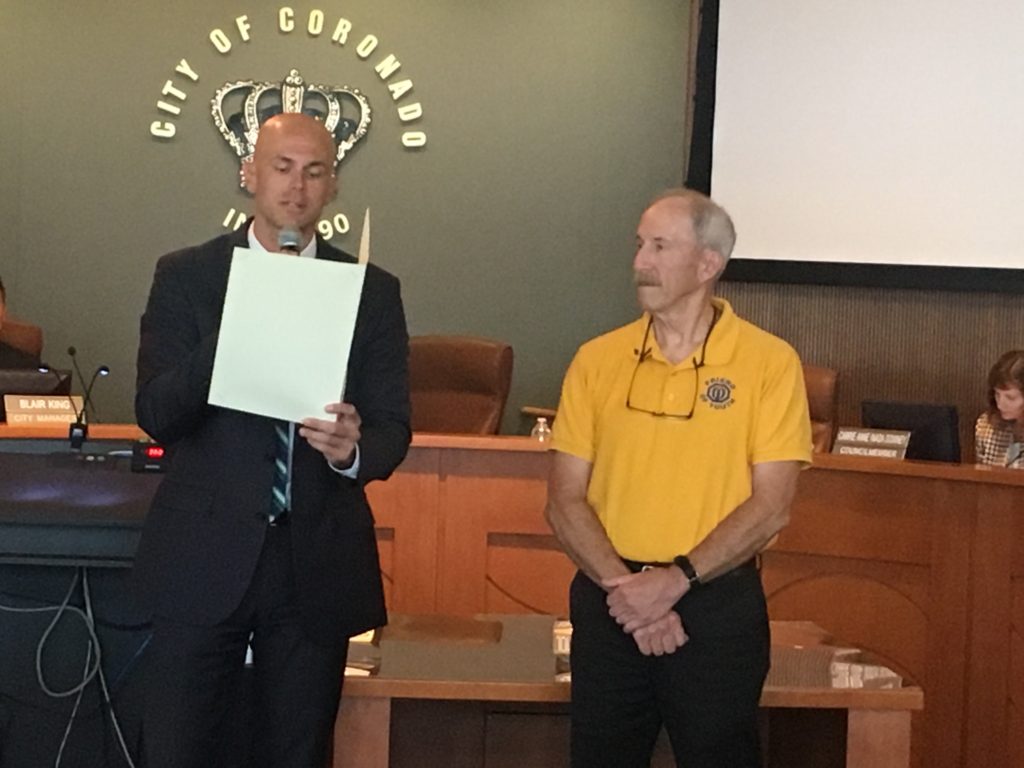
Mayor Bailey presented Don Crawford, president, Optimist Club of Coronado, with a certificate recognizing Coronado Optimists Sports Fiesta Week, July 24-28. The 47th annual Sports Fiesta will be held on July 28 at Sunset Park. Highlights include a 5k walk/run, a one mile swim, a mini-triathlon, pickle ball, lawn bowling, volleyball, and cornhole tournaments. This event raises between $40,000 and $50,000 to support the youth of Coronado in a variety of ways.
The most discussed agenda item was the proposed Draft Active Transportation Plan (ATP), which is required by California law. Twelve people from the community spoke, some in favor and some against the plan. City Manager Blair King pointed out that the Council saw the plan on March 6, heard public comments, and deleted items. He mentioned that, “This plan is only a roadmap. It provides options for the city council to consider at a later date, when time and money are available.”
Allie Scrivner, Active Transportation Planner, said that this plan encompasses three plans: a new pedestrian master plan, an update to the 2011 bicycle master plan, and a safe routes to school plan since about half of Coronado students bike or walk to school.
New recommendations from the Council were incorporated, including adding new high visibility crosswalks to 1st and 2nd Streets, squaring up intersections with painted curb extensions on Olive and 10th, and similar pedestrian crossings on Isabella Ave and Ocean Blvd. Councilmember Sandke asked the city to look at options for Pomona and 6th, with the possibility of raised crosswalks for traffic calming and increased visibility. Mayor Bailey and Councilmember Downey questioned why the proposed bike lanes on Alameda from 1st to 10th changed to sharrows (shared lane markings) from 10th to Ocean Blvd and questioned the costs of bike lane striping. He asked the logic behind encouraging bikes to go on Alameda and Pomona. Councilmember Downey said that cyclists like those streets, due to the lack of stop signs. Councilmember Benzian queried other options for achieving safety on Pomona Ave. He supports enhanced safety without destroying the aesthetics of our town. Councilmember Donovan pointed out that education is critical and that “safety is the key issue we need to address and changes must show a measurable improvement.” He also addressed safety issues in “door zones.” He suggested an ordinance that would prohibit walkers from using smart phones in crosswalks, creating a ‘bike school’ for people who receive tickets, and looking at reducing speeds from 25 mph to 20 mph on residential streets. Councilmember Downey also wants to emphasize pedestrian safety.
“We’ve been down this bike lane before,” joked Mayor Bailey. He pointed out the 2010/2011 Bicycle Master Plan failed because of lack of community input and inability to act on it and so it got dismantled. It was suggested to look at the marginal benefit versus marginal cost, and while the vast majority of collisions occur on Orange Avenue, most of the suggested improvements are on other streets. “Coronado is an inherently safe place to ride bikes and walk, but the question is can we make it safer?” he noted.
The Council voted to continue discussion on the plan and revisit a revised version at the September 4 meeting. City staff was directed to refine costs for bike lanes/routes and look into diversion programs for bicycle offenders, sign requirements, and reevaluate the idea of directing bicyclists on minor arterial streets like Alameda Blvd and Pomona Ave.
Click HERE to view the Draft Active Transportation Plan.
The Historic Preservation subcommittee presentation was made by Councilmembers Downey and Donovan who were praised for their work on this process. Proposed changes include: wording changes to each Criterion, reducing the number of Criterion from two to one for designation, and changing the number of years from 75 to 50 to qualify for designation. A Historic Home Survey is recommended to be conducted shortly and then updated every 10 years. Proposed actions also included soliciting and selecting three to five contractors for individual historic evaluation studies. Once selected, a third party review requirement would begin and a new fee schedule would go into effect. The City would pay for the historic review and then the proposed fee for nomination for historic designation is $900 and $100 for the Mills Act Agreement. The Historic Alteration Permit (HAP) with and without demolition, and code exception will remain the same. The Applicant Appeal Decision and Appeal by other than applicant will also remain the same. The Notice of Intent to Demolish Review (NOI) will decrease from $1697 to $900.
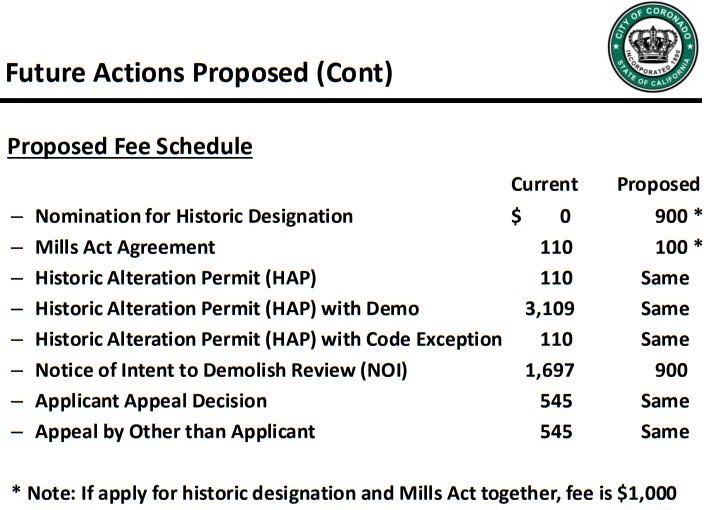
Mayor Bailey made a motion to move the Historic Preservation changes forward, but retain the two criteria for historic eligibility, as well as the 75-year criterion until an initial Historic Home Survey is completed. They will then re-evaluate implementing changes, after the survey is completed. The Council is interested in the number of homes eligible for historic designation and Mills Act.
City Manager King briefly presented the Successor Agency (SA) Resolution and Councilmember Downey stated for the record that the City Council and Successor Agency meetings are one and the same, but there has been confusion about the city’s fiscal responsibility on this issue and King stated that, “Bonds are based on income derived to SA from State of California. Outstanding bonds are paid from the redevelopment property trust fund, which is not from the City of Coronado revenues.” The council passed the resolution that the Successor Agency will refinance the outstanding debt it holds into a lower interest rate to benefit the CUSD.
Regarding the resolution of increasing the number of words permitted in a candidate’s statement of qualifications, it has come to the Council’s attention that there will be an increased cost from the Registrar of Voter’s based on their formula of printing and mailing ballots in four languages. Cost is based on number of words that the city allows, which was previously 200 words and most recently revised to 400 words. There was a debate on if the resolution had already gone through, and because the Registrar’s office had already been notified, the cost for candidates will go from $600 to between $1350 and $1600. They will see if it impacts the 2018 election cycle and then revisit this for 2020.
The results of the latest National Citizen Survey were presented by Dr. Tom Miller. This is the third in a series of self-assessment surveys conducted on behalf of the city (2011, 2014 and 2018). 1500 random households were selected to receive the surveys. With a 31 percent response rate, the survey showed that participants most valued safety and community engagement as top priorities in Coronado. 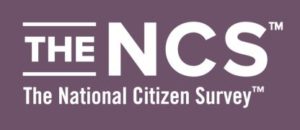 Ninety seven percent felt this was a great place to live, and an almost an equal number praised the quality of city services, like safety, police, fire and ambulance. People liked the summer shuttle, but didn’t feel it was needed year round. The majority wanted the short term rentals kept to 26 days. Other highlights included mobility issues as people wanted solutions to reduce traffic on Orange Avenue, keeping street maintenance and bike lanes a priority for infrastructure, and reducing the home density. They felt there is an appropriate amount of public art in the city, and most liked the decorative banners on Orange Avenue. To see the complete survey results breakdown, with seven comprehensive reports, visit:
Ninety seven percent felt this was a great place to live, and an almost an equal number praised the quality of city services, like safety, police, fire and ambulance. People liked the summer shuttle, but didn’t feel it was needed year round. The majority wanted the short term rentals kept to 26 days. Other highlights included mobility issues as people wanted solutions to reduce traffic on Orange Avenue, keeping street maintenance and bike lanes a priority for infrastructure, and reducing the home density. They felt there is an appropriate amount of public art in the city, and most liked the decorative banners on Orange Avenue. To see the complete survey results breakdown, with seven comprehensive reports, visit:
https://www.coronado.ca.us/government/about/citizen_satisfaction_survey




